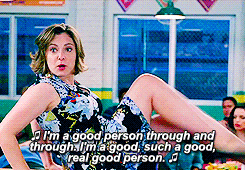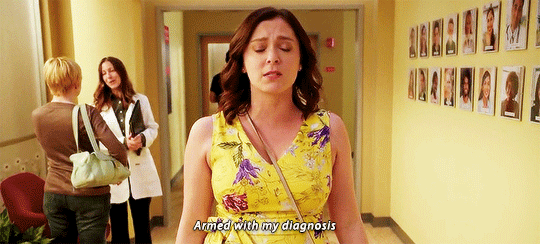
I grew up listening to musicals.
If you met me today, you might not know that, given the fact that once I got to college, I didn’t follow the Broadway musical circuit as much. Today I couldn’t even tell you what musicals are nominated for the Tony Awards. It’s a little sad, actually.
The reason I loved musicals then and still do today is because of their escapism. There’s something so unbelievably satisfying about spending a few hours engulfed in a world where people randomly burst out into song whenever they’re feeling something deeply. In musicals, people get the chance to live in fantastical worlds. There is no limit to what is possible, generally, in a musical.
When Crazy Ex-Girlfriend came onto our screens a few years ago, it sought to be a conversation-starting, groundbreaking musical comedy. It was racy and funny, but also incredibly poignant. And it followed on the heels of other shows, mostly dramas, with its portrayal of a complex anti-hero. As the show ends tonight, I wanted to take some time to reflect on Crazy Ex-Girlfriend’s significance. Looking back, it made such an impact on me that I wrote multiple posts about it (here | here | here).
The little-show-that-could ended on its own terms, and credit goes to Aline Brosh McKenna and Rachel Bloom, as well as the show’s numerous writers, for constructing such an interesting and crucial arc for Rebecca Bunch. The woman we met in the pilot is not the same woman we watch sing in the finale — and for that, I’m eternally grateful.

SING ME A SONG OF AN ANTI-HEROINE
The rise of the anti-hero in film and television in recent years has been an interesting one. People are quick to point out Walter White from Breaking Bad as a typical example, but essentially an anti-hero is someone who’s the central figure of a story but lacks a lot of the traditional heroic characteristics.
It leaves the audience a little confused — on the one hand, we are conditioned by popular media to root for the main character. But anti-heroes do things that heroes don’t. So are we supposed to root when Rebecca Bunch lies to Josh, breaks into homes, steals, manipulates the emotions of others, and seeks to split Josh up with Valencia? Are we supposed to reward her bad behavior just because she’s the main character in the story we’re watching?
I think Crazy Ex-Girlfriend’s ability to ask that central question without telling the audience how or what to think of Rebecca is important. While so many television shows are heavy-handed with exposition or “subliminal” messages about what to think about a character or situation, a lot of Crazy Ex-Girlfriend’s storytelling has involved allowing the viewer to craft their own thoughts and opinions about Rebecca Bunch and her behavior. We’re given permission to root for her, but also be disappointed by her. We’re allowed the space to dismiss her actions as villainous altogether (“I’m the Villain in My Own Story” is my favorite song from the show for this reason).
Ultimately the show portrayed a character who was incredibly broken and flawed, surrounding her with characters who were broken and flawed (sometimes in less obvious ways), while also not allowing Rebecca’s actions to be without consequence. Did you root for Rebecca to get away with her lies? Or to get caught? Did you want her to find love with Josh? Or Greg? Or Nathaniel?
The importance of an anti-hero is their arc: Rebecca didn’t stay the way she was in season one. And she faced consequences for her actions too by actually owning them.

A FUNNY AND SOMETIMES DARK LOOK AT MENTAL HEALTH
Rebecca began to truly own her behavior when she identified the root cause of it. For most of her life, Rebecca was misdiagnosed by mental health professionals; she received incorrect or dangerous diagnoses. Mid-way through the third season of the series is a pivotal moment in the show’s trajectory — Rebecca’s attempted suicide. Not only was the moment a tonal shift for the series (I cried when I watched the screener), but also a pivotal character-centric and plot shift as well.
When Rebecca is diagnosed with BPD, she begins to approach life, her recovery, and therapy differently. Armed with a reason for her behavior and a path forward, Rebecca begins to actually take ownership for her issues rather than blame-shift them onto others. As a result, she starts her journey in becoming a healthy, honest individual.
Crazy Ex-Girlfriend’s contribution to a national (or worldwide) discussion on mental health can’t be overstated. The show isn’t the first to tackle the discussion but its musical comedy format allowed it to have an entire La La Land-themed number about how common it is to be on antidepressants. Rebecca sings a song called “My Diagnosis” when she receives her BPD diagnosis. A musical format is the perfect way to approach these discussions in funny, accurate, and engaging ways.
The way the show didn’t oversimplify the issues that come with mental health was of utmost importance. It didn’t minimize struggles or try to present a neat and tidy solution where there is none. Sure, Rebecca begins to improve when she receives her diagnosis and is on the right medication. But it also showed us a musical number where someone’s medicine isn’t working for them and they need to switch. Mental health is an ongoing conversation and a complex issue. Crazy Ex-Girlfriend’s constant dedication to the honoring and elevation of the subject matter is not just admirable — it’s downright invaluable.
I’m incredibly grateful this show allowed us all the chance to explore our own motivations, issues, and watch a woman grow and heal from the wounds that she and others have inflicted.

THE GIRL AND GUY SQUAD
The character development in the series isn’t just limited to Rebecca Bunch though. I’m incredibly grateful that the series conveyed the importance of community. One of my favorite images of the series is Valencia, Heather, and Paula sleeping outside of Rebecca’s door after her suicide attempt just in case she needed them. Crazy Ex-Girlfriend actually managed to flip a tried narrative on its head (two girls rival for the same guy), by allowing Valencia to grow and Rebecca to grow as well — to the point that they’re now more evolved versions of themselves and actually very good friends.
Paula changed so much from the beginning of the series too, and it was important to me (even if earlier on it felt like this part of her life was neglected by the writers) that Paula wasn’t a young single woman. She’s a married mother of two who serves more as Rebecca’s mother than her sister — a dynamic, of course, the show readily explored. But how amazing is it that Paula advanced in her career and became a lawyer? That she wasn’t just brushed aside as “only a mom” by the series, and was allowed the chance to have dreams and goals independent of motherhood.

Furthermore, members of the supporting cast were allowed to be fully-realized characters and grow on their own. Valencia, Heather, Nathaniel, Greg, and (to some extent) Josh all became better versions of themselves by the end of the series. Valencia found love and vulnerability, Heather found her purpose, Nathaniel found his empathy and humanity, Greg found release from his addiction and anger, and Josh found... well, I’m not sure yet. Forgiveness and closure, maybe?
There are people in our lives who shape us into who we’re meant to be, and I feel like Crazy Ex-Girlfriend did a great job at reminding us that healing happens in community — whether sitting on a couch with your girl group, in therapy with others, or by having an honest conversation with your best friend.

GOODBYE, WEST COVINA
So much of Crazy Ex-Girlfriend was... well, crazy. It had intensely catchy, lyrically genius songs. It had nuanced, layered characters who grew and changed and became people we wanted to see succeed. It had production-breaking musical numbers (I’m looking at you, “Love Kernels”). Its fourth-wall-breaking humor cannot be praised hard enough.
Crazy Ex-Girlfriend was meta and wild and wonderful. It celebrated so many things that, as women, we’re told to be quiet or delicate about. It stepped boldly into conversations about difficult subjects without pretending to have all the answers. It opened up a space where we could grapple with our own issues and feel like we belonged — no matter what.
There’s nothing like this show, nor will there likely be anything else like it. As Rachel Bloom hoped, I do believe we left Rebecca Bunch in a better place than when we first found her.
Is there anything better than that?




0 comments:
Post a Comment